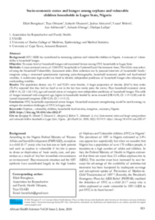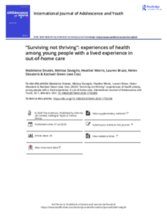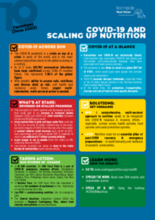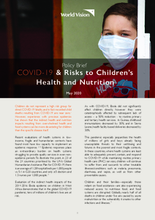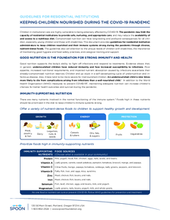Displaying 21 - 30 of 243
The purpose of this study from the journal of African Health Sciences was to assess the level of household hunger and associated factors among orphans and vulnerable children (OVC) households in Lagos State, Nigeria.
"New data show that an unprecedented number of children in the United States are experiencing food insecurity and did not have sufficient food as of late June," writes Lauren Bauer in this blog post for the Brookings Institution.
This study aimed to explore the experiences and perceptions of health among young people (YP) who have previously lived in care.
This study describes healthcare utilization from July 1, 2014 to June 30, 2016 among children in foster care in the greater Houston, Texas area who receive Medicaid coverage through a single Medicaid managed care organization for children in foster care.
This UN brief examines the COVID-19 pandemic's threats to food security and nutrition of millions of people around the world and suggests three mutually reinforcing sets of priority actions to address the immediate, near- and medium-term needs to protect people during and beyond the crisis, and – ultimately – to reshape and build resilient food systems.
This one-page factsheet from Scaling Up Nutrition (SUN) provides facts and information about COVID-19 and malnutrition.
This editorial from The Lancet Global Health discusses the effect of COVID-19 on food insecurity, particularly for women and children.
This study used empirical data from health and social care professionals and cluster analysis to identify “barriers to” and “recommendations for” providing care and support to children living as AIDS orphans in township communities in Nelson Mandela Bay South Africa.
Based on experience working with children, families and communities in emergencies, including epidemics, in this policy brief, World Vision outlines a number of recommendations for Governments, UN Agencies, Donors, NGOS, Private Sector and Faith Leaders to mitigate the impacts of COVID-19 on children’s health and nutrition, particularly for vulnerable children.
This document from the Spoon Foundation provides guidelines for residential institution administrators to keep children nourished and their immune systems strong during the pandemic through diverse, nutrient-dense foods.

